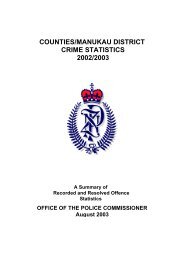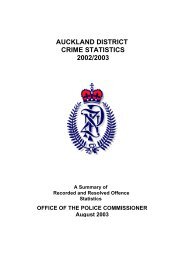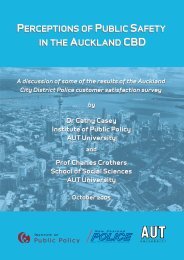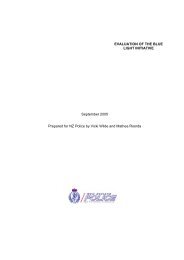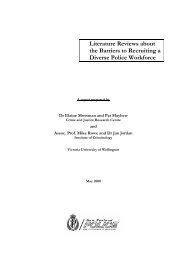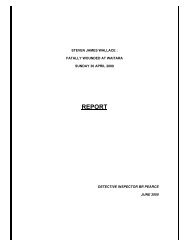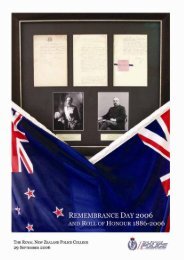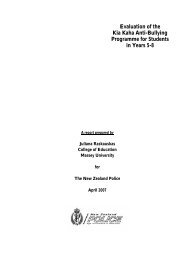Police Perceptions of Maori - Rethinking Crime and Punishment
Police Perceptions of Maori - Rethinking Crime and Punishment
Police Perceptions of Maori - Rethinking Crime and Punishment
Create successful ePaper yourself
Turn your PDF publications into a flip-book with our unique Google optimized e-Paper software.
attitudes to <strong>Maori</strong> political aspirations. Scores on this scale were used to determine<br />
factors affecting perceptions <strong>and</strong> attitudes. <strong>Maori</strong> <strong>of</strong>ficers, older <strong>of</strong>ficers, senior<br />
sergeants <strong>and</strong> those no longer in the front line were more likely to have favourable<br />
attitudes than New Zeal<strong>and</strong> European <strong>of</strong>ficers, younger <strong>of</strong>ficers, constables <strong>and</strong> those<br />
in the front line. Increased contact with <strong>Maori</strong> in one's private life, either through<br />
social activities or family membership, was also associated with more favourable<br />
attitudes although work contact with <strong>Maori</strong> seemed irrelevant. Several <strong>of</strong>ficers<br />
mentioned their experiences with marae programmes as increasing their underst<strong>and</strong>ing<br />
<strong>of</strong> <strong>Maori</strong> issues. These findings suggest that, given the right type <strong>of</strong> contact with<br />
<strong>Maori</strong> people, it is possible to increase underst<strong>and</strong>ing <strong>and</strong> promote positive responses.<br />
Finally, a number <strong>of</strong> questions explored responses to proposed policies <strong>and</strong> strategies<br />
aimed at building responsiveness to <strong>Maori</strong>. Overall, respondents agreed with most <strong>of</strong><br />
the proposals or were at least neutral toward them. However, proposals to recruit <strong>and</strong><br />
promote <strong>Maori</strong>, to emphasise police commitment to the Treaty <strong>of</strong> Waitangi <strong>and</strong> to<br />
provide <strong>Maori</strong> translation on request were disagreed with by a significant minority.<br />
Comments indicated that issues <strong>of</strong> equity were at the heart <strong>of</strong> much <strong>of</strong> the<br />
disagreement <strong>and</strong> suggest that affirmative action policies in recruitment <strong>and</strong> promotion<br />
<strong>of</strong> <strong>Maori</strong> police will meet with considerable resistance. Increasing <strong>Maori</strong><br />
representation will be best achieved by ensuring that well educated <strong>Maori</strong> are recruited.<br />
The views <strong>of</strong> police <strong>of</strong> <strong>Maori</strong> descent <strong>and</strong> those who identified themselves as New<br />
Zeal<strong>and</strong> European or Pakeha were compared. In general, the two groups did not hold<br />
different views on police attitudes, language or behaviour. But on specific aspects <strong>of</strong><br />
behaviour, <strong>of</strong>ficers <strong>of</strong> <strong>Maori</strong> descent were more likely to report discrimination,<br />
especially in responding to members <strong>of</strong> the public, stopping cars, using abusive<br />
language with <strong>of</strong>fenders <strong>and</strong> treating suspects roughly. <strong>Police</strong> <strong>of</strong> <strong>Maori</strong> descent were<br />
also more likely to report that the police had negative attitudes to <strong>Maori</strong>. One<br />
interpretation <strong>of</strong> this is that <strong>Maori</strong> <strong>of</strong>ficers were more likely than others to see the<br />
actions <strong>of</strong> their colleagues as displaying negative attitudes <strong>and</strong> behaviour toward<br />
<strong>Maori</strong>. Another interpretation is that <strong>Maori</strong> <strong>of</strong>ficers were more likely to describe real<br />
differences in behaviour <strong>and</strong> this is supported by the fact that, on several <strong>of</strong> the<br />
behavioural items, there were no differences in the perceptions <strong>of</strong> <strong>Maori</strong> <strong>and</strong> other<br />
police <strong>of</strong>ficers. It is not possible to check either <strong>of</strong> these interpretations without<br />
carrying out an observational study.<br />
The findings raise questions about the position <strong>of</strong> the <strong>Maori</strong> police <strong>of</strong>ficer within the<br />
service <strong>and</strong> the extent to which he or she has a distinctive view. The data show that<br />
<strong>of</strong>ten the views <strong>of</strong> <strong>Maori</strong> police <strong>of</strong>ficers are indistinguishable from those <strong>of</strong> other<br />
police. Some <strong>of</strong> them clearly share the negative views <strong>and</strong> attitudes toward <strong>Maori</strong><br />
<strong>of</strong>fenders that characterise some <strong>of</strong> their colleagues. Perhaps this is not surprising.<br />
Other research demonstrates the power <strong>of</strong> the occupational culture in shaping the<br />
attitudes <strong>and</strong> behaviour <strong>of</strong> groups within the police who do not fit the traditional police<br />
stereotype. Heidensohn (1992) discusses the conformity <strong>of</strong> women to the male police<br />
culture in Engl<strong>and</strong>. One study cited by Heidensohn actually showed that policewomen<br />
were more similar to their male colleagues on a number <strong>of</strong> personality measures<br />
including femininity than they were to nurses (p 93). She cites a description <strong>of</strong> the<br />
phenomena as a mark <strong>of</strong> the conquest <strong>of</strong> biography by occupation (p 89). A parallel<br />
can be drawn with the results here where the attitudes <strong>of</strong> some <strong>of</strong> the <strong>of</strong>ficers <strong>of</strong> <strong>Maori</strong><br />
descent may well be more similar to those <strong>of</strong> other police than to those <strong>of</strong> <strong>Maori</strong><br />
outside the service.<br />
35



